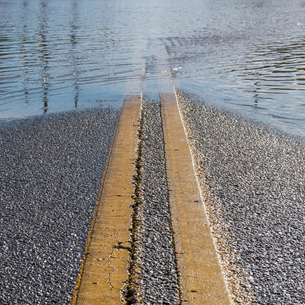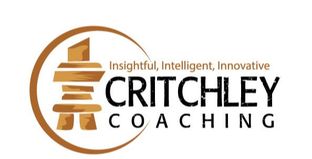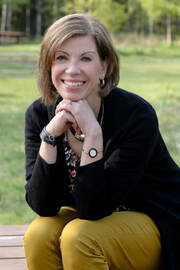
Perhaps I was a bit premature in my excitement. Perhaps I got carried away before I fully knew what the rain gods were capable of, for this week they unleashed their full force on our city and surrounding countryside dropping more rain in a couple of days than we usually receive in a month.
I missed most of it, watching from afar as I facilitated a leadership retreat on the shores of Lake Huron. While each day, I awoke to calm, glasslike water, a clear blue sky and temperatures rivaling the hottest days of summer in Calgary, my family at home awakened to torrential rain.
The forecast for the rain came just before I left the city and caused great unease among the residents. The flood of 2013 has not yet left our memories. 2013 was an unexpected and frightening time. Like it was yesterday, I remember so well having the morning off work that day to drive Jim to his six-week check up after his second open-heart surgery. This one, while open heart, was not to fix his heart. Nine months earlier he’d had a quadruple bypass surgery. Just days after that initial surgery, all the wires used to close his sternum failed, bursting the wires into tiny bits inside him and leaving the sternum healed but not together. This surgery was to remove the hundreds of bits of wire left inside him, and then to close the sternum with four long titanium rods. Our appointment was on that June day in 2013.
The appointment was kind of exciting. We had looked forward to the day. Jim was feeling well and we fully expected he’d get the go-ahead to drive again, and that he was out of the woods in terms of his unjoined sternum.
It was raining as we headed toward the Foothills hospital, but no flood warnings were issued. It felt like a rainy June day.
Only a couple of hours later, we dodged heavy rain as we made our way back to our car with a clean bill of health. As we listened to the news, we couldn’t believe what we were hearing; bridges were washed out, rivers overflowing their banks, towns were cut off from other towns, large trees and boulders were being swept down swollen streams and the residents of small towns and large cities alike were being evacuated. It took us a long time to really register what we were hearing.
While Calgarians and Albertans are a resilient bunch, that flood tested and shook every one of us. Yes, everyone pitched in to help. Yes, there were stories of heroics and incredible kindnesses. Yes, there were things to be thankful for. But for those directly affected, it was devastating. For the rest of us, it unsettles us to this day.
So, last week when Jim told me about the rainfall warning and potential for flooding, I, like all Albertans, felt a worry go through me. This year, the snowpack in the mountains is exceptionally heavy, heavier by far than in 2013, and the rain was expected to be just as heavy. Yet as I write this, while gentle rain is still falling, and despite the fact the rains have come, torrential at times, and the rivers are swollen, the floods have not come.
It's hard to believe. The conditions were all there, yet the waters were contained. It’s unbelievable. And yet not.
2013 was disaster. Literally. But once the imminent crisis had passed, once the waters had receded and there was only sand, silt and mould, unlivable homes and unstable building foundations, and uprooted trees and boulders to deal with, every municipality and district affected got to work to make changes so that, heaven forbid, should the crazy conditions align once again, we’d be much better prepared.
There was some grumbling about the cost of the mitigation. After all, the event of 2013 was billed as a ‘once in a hundred years’ event. What were the chances it would happen again? Yet for the most part, the vast majority were on board and mitigation went ahead. Thank goodness it did. This week we were spared. Certainly, some outdoor events had to be cancelled, but by and large, all that was endured was rain and wind.
I’ve been thinking about the contrast in those two weather events, the one from 2013 and the one from this week, clearly not one hundred years later. I’m thinking most of us could borrow a page from that book. Luckily, most people never have to deal with a severe disaster. But when we do, we want to do everything in our power to make possible a different outcome the next time.
While we may not have to deal with severe disasters, almost every single one of us does deal with micro-disasters, in our lives. Perhaps not the kind where we’ve set our hair on fire, for these kinds teach us quickly how to avoid them. But the kind that feel less life-threatening are easy to repeat. The kind where we offer opinions that aren’t needed, or when we hurt someone’s feelings without meaning to, or when we put meaning to someone else’s actions that are not accurate, or when we miss the important meaning of what someone is trying to say, or when we sabotage our own success at something by repeating familiar behaviours, all the while hoping for a different result.
I’m thinking of the pride, and perhaps relief, being felt by our elected officials this week. Pride that their hard work, careful planning, and willingness to change, paid off.
Most of us have potential impending micro-disasters heading our way. We’re human after all. Most of us, should we take a few moments to reflect, could easily change the outcome of these with very few minor changes and at little cost to ourselves.
Perhaps we’d do well to take a page from the incredible response we saw in 2013 to make a lasting positive change in our own lives.
Stay dry, my friends!
My inquiry for you this week is, ‘How is this helping me avoid ‘disaster’?’
Elizabeth is a certified professional Leadership Coach, and the owner of Critchley Coaching. She is the founder and president of the Canadian charity, RDL Building Hope Society. She works with corporations, non-profits and the public sector, providing leadership coaching. She creates and facilitates custom workshops for all sizes of groups. She has expertise in facilitating Strategic Plans for organizations and for conducting leadership reviews. Contact Elizabeth to learn how to avoid micro-disasters in life and work.


 RSS Feed
RSS Feed